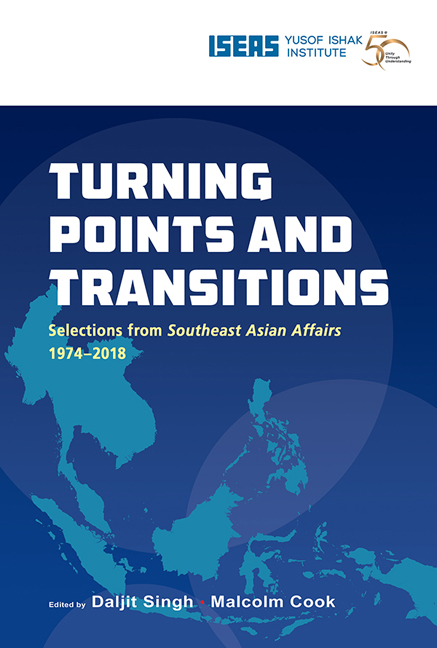Book contents
- Frontmatter
- Contents
- Message from the Director
- Foreword
- Foreword
- Introduction
- THE REGION
- BRUNEI
- CAMBODIA
- INDONESIA
- Indonesia's Armed Forces: Rejuvenation and Regeneration (1982)
- Indonesia: The Pancasila State (1985)
- The Indonesian Economy Facing the 1990s: Structural Transformation and Economic Deregulation (1990)
- A Year of Upheaval and Uncertainty: The Fall of Soeharto and Rise of Habibie (1999)
- Indonesia: The Regional Autonomy Laws, Two Years Later (2003)
- The Impact of Domestic and Asian Regional Changes on Indonesian Foreign Policy (2010)
- ISIS in Indonesia (2015)
- LAOS
- MALAYSIA
- MYANMAR
- THE PHILIPPINES
- SINGAPORE
- THAILAND
- VIETNAM
Indonesia's Armed Forces: Rejuvenation and Regeneration (1982)
from INDONESIA
Published online by Cambridge University Press: 29 May 2019
- Frontmatter
- Contents
- Message from the Director
- Foreword
- Foreword
- Introduction
- THE REGION
- BRUNEI
- CAMBODIA
- INDONESIA
- Indonesia's Armed Forces: Rejuvenation and Regeneration (1982)
- Indonesia: The Pancasila State (1985)
- The Indonesian Economy Facing the 1990s: Structural Transformation and Economic Deregulation (1990)
- A Year of Upheaval and Uncertainty: The Fall of Soeharto and Rise of Habibie (1999)
- Indonesia: The Regional Autonomy Laws, Two Years Later (2003)
- The Impact of Domestic and Asian Regional Changes on Indonesian Foreign Policy (2010)
- ISIS in Indonesia (2015)
- LAOS
- MALAYSIA
- MYANMAR
- THE PHILIPPINES
- SINGAPORE
- THAILAND
- VIETNAM
Summary
On 5 October 1981, Indonesia's Armed Forces, ABRI (Angkatan Bersenjata Republik Indonesia), celebrated its thirtysixth anniversary with a massive display of military pomp and muscle. At the Cilegon naval centre, on the shores of West Java, in front of an audience of thousands, 20,000 members of ABRI took part in a war-like exercise that featured a fly-past of fifty planes including American built F-5E “Tigers”, A-4 “Skyhawks”, and OV-10 “Broncoes”, and a naval parade of thirtyseven vessels showcasing Indonesia's two NATO class submarines and the French Exocet surface-to-surface missile systems of the Navy's new corvettes and fast-attack craft. Combat troops stormed ashore in a mock amphibious landing, putting their newly acquired Western-made armour on the beach. Similar, albeit more modest, demonstrations of Indonesia's military hardware took place at Medan, North Sumatra, and Ujung Pandang in South Sulawesi.
Although at one level of analysis obviously a show of force in a troubled regional international environment, this year's ABRI display again illuminates the central position that the Armed Forces occupy in Indonesia's national life. In the words of Defence Minister and ABRI's Commander, General Mohammad Jusuf, Armed Forces Day was meant to underline ABRI's role in “strengthening national resilience and enhancing the unity of the country and people” (Straits Times, 5 October 1981). From the point of view of ABRI's leadership, this is a critical task in an atmosphere in which the traditional cleavages of race, ethnicity, and religion are exacerbated by the social and political antagonisms engendered by uneven patterns of economic change, perceived inequalities in income distribution, and corruption — in 1981 heated up by the run-up to the 1982 general elections to be followed by the presidential selection process in 1983.
The military portion of “national resilience” is conceptualized in the formulations of the People's Defence System, HANKAMRATA (Pertahanan Keamanan Rakyat Semesta), which seeks to unite functionally the wider society with the Armed Forces in the territorial defence of the wawasan nusantara — the indivisible unity of the land and sea elements of the archipelago. The doctrine explicitly relates the economic, political, social, and psychological factors of national development to the tasks of defence.
- Type
- Chapter
- Information
- Turning Points and TransitionsSelections from Southeast Asian Affairs 1974-2018, pp. 275 - 282Publisher: ISEAS–Yusof Ishak InstitutePrint publication year: 2018

